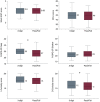The Impact of Changing Step 1 to Pass/Fail Reporting on Anxiety, Learning Approaches, and Curiosity
- PMID: 37886271
- PMCID: PMC10597890
- DOI: 10.1007/s40670-023-01878-w
The Impact of Changing Step 1 to Pass/Fail Reporting on Anxiety, Learning Approaches, and Curiosity
Abstract
Purpose: Given the significance of the US Medical Licensing Exam (USMLE) Step 1 score moving from a 3-digit value to pass/fail, the authors investigated the impact of the change on students' anxiety, approach to learning, and curiosity.
Method: Two cohorts of pre-clerkship medical students at three medical schools completed a composite of four instruments: the State-Trait Anxiety Inventory, the revised two-factor Study Process Questionnaire, the Interest/Deprivation Type Epistemic Curiosity Scale, and the Short Grit Scale prior to taking the last 3-digit scored Step 1 in 2021 or taking the first pass/fail scored Step 1 in 2022. Responses of 3-digit and pass/fail exam takers were compared (Mann-Whitney U) and multiple regression path analysis was performed to determine the factors that significantly impacted learning strategies.
Results: There was no difference between 3-digit (n = 86) and pass/fail exam takers (n = 154) in anxiety (STA-I scores, 50 vs. 49, p = 0.85), shallow learning strategies (22 vs. 23, p = 0.84), or interest curiosity scores (median scores 15 vs. 15, p = 0.07). However, pass/fail exam takers had lower deprivation curiosity scores (median 12 vs. 11, p = 0.03) and showed a decline in deep learning strategies (30 vs. 27, p = 0.0012). Path analysis indicated the decline in deep learning strategies was due to the change in exam scoring (β = - 2.0428, p < 0.05).
Conclusions: Counter to the stated hypothesis and intentions, the initial impact of the change to pass/fail grading for USMLE Step 1 failed to reduce learner anxiety, and reduced curiosity and deep learning strategies.
Supplementary information: The online version contains supplementary material available at 10.1007/s40670-023-01878-w.
Keywords: Curiosity; Learner anxiety; Learning behaviors; USMLE Step 1 examination.
© The Author(s) under exclusive licence to International Association of Medical Science Educators 2023. Springer Nature or its licensor (e.g. a society or other partner) holds exclusive rights to this article under a publishing agreement with the author(s) or other rightsholder(s); author self-archiving of the accepted manuscript version of this article is solely governed by the terms of such publishing agreement and applicable law.
Conflict of interest statement
Conflict of InterestThe authors declare no competing interests.
Figures



References
-
- Barone MA, et al. Summary report and preliminary recommendations from the Invitational Conference on USMLE Scoring (InCUS), in Invitational Conference on USMLE Scoring (InCUS) Burlington, VT. 2019;p. 20.
LinkOut - more resources
Full Text Sources
Miscellaneous
